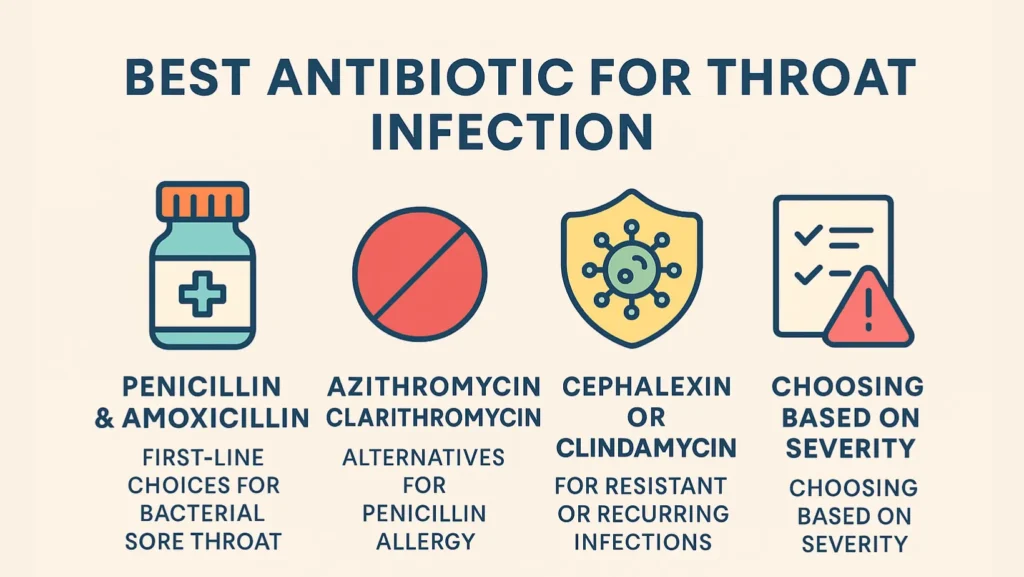Antibiotics for throat infection treat bacterial causes, stop the spread, and cut the risk of complications. You get them only when tests or clear signs point to bacteria. Penicillin or amoxicillin works best for most streptococcal infections. If you are allergic, doctors pick another safe drug. Finish the full course to prevent return and resistance.
Table of Contents
ToggleWhat Is A Throat Infection?
A throat infection makes your throat painful and scratchy. You may also have a fever, swollen glands, and white spots on the tonsils. Sometimes you cough and have a runny nose.
A throat infection can come from a virus or a bacterium. Viruses do not get better with antibiotics for a throat infection. Bacterial infections may need antibiotics to heal faster and stop complications. Use testing and simple clinical checks to decide.
Types: Bacterial Vs. Viral Sore Throat
A viral sore throat often comes with cough, sneezing, and a runny nose. It usually gets better with rest and fluids. A bacterial sore throat often has sudden fever, no cough, and swollen neck glands. Group A Streptococcus causes many bacterial cases. If a rapid test or throat culture shows bacteria, doctors use antibiotics to treat the throat infection to treat it.
When Antibiotics Are Actually Needed
You need antibiotics when tests show Group A Streptococcus or when scores like Centor suggest a high chance of bacteria. Doctors avoid antibiotics for likely viral illness. Unneeded antibiotics cause side effects and help bacteria become resistant. You should not pressure a doctor for medicine if the test is negative. Follow test results and clinical advice.
Common Bacteria Causing Throat Infections (Streptococcus Pyogenes, Etc.)
The main bacterium is Streptococcus pyogenes. Clinicians call it Group A Strep. It causes fever, painful swallowing, and white patches on the tonsils. Other bacteria can cause throat infection, but less often. When Group A Streptococci are found, doctors prescribe antibiotics for a throat infection to stop the spread and prevent complications like rheumatic fever.
Best Antibiotic For Throat Infection
Choosing the right drug depends on allergy, age, severity, and test results. For most people, penicillin or amoxicillin works best. These drugs kill the bacteria that cause the infection. They are safe, cheap, and proven to work. If you have a penicillin allergy, doctors pick other options such as macrolides or cephalosporins.
Penicillin And Amoxicillin — First-Line Choices For Bacterial Sore Throat
Penicillin and amoxicillin remain the first choice for Group A Strep. The bacteria have low resistance to penicillin. Amoxicillin tastes better for children and is easy to use. Typical treatment for adults is ten days of penicillin or amoxicillin. Follow the dose instructions from the prescriber. Antibiotics for throat infection given this way can clear the bacteria reliably.
Azithromycin And Clarithromycin — Alternatives For Penicillin Allergy
If you are allergic to penicillin, the doctor may use azithromycin or clarithromycin. These are macrolide antibiotics. They work against many throat bacteria. Note that some bacteria show resistance to macrolides in some areas.
Your doctor uses local resistance information when choosing. Use these drugs only when a true allergy exists. Antibiotics for throat infection, such as azithromycin, give a shorter course in many cases.
Cephalexin Or Clindamycin — For Resistant Or Recurring Infections
For repeated infections or strong allergy reactions, doctors may choose cephalexin or clindamycin. Cephalexin is a cephalosporin. Clindamycin works well when other drugs fail.
These options help when standard drugs do not work or when tests show a need to change. Your doctor explains the reason for switching. Antibiotics for throat infection, like clindamycin, may be used when tests show resistance.
Choosing The Right Antibiotic For Throat Infection Based On Severity
Mild throat pain with cough likely needs no antibiotics. With high fever, swollen glands, or positive tests, doctors treat with antibiotics. Severe pain that blocks swallowing, fast-spreading infection, or signs of airway problems require urgent care and likely antibiotics.
Your doctor weighs the benefits against the risks, like side effects and resistance. If tests confirm bacteria, antibiotics for a throat infection offer a clear benefit.
Throat Infection Antibiotic Treatment: What To Expect
You should know how antibiotics work and what will change when you start them. Expect steady improvement. Watch for side effects. Keep in close contact with your health provider if you do not improve.
Typical Strep Throat Antibiotics Duration (7 To 10 Days)
Most guidelines recommend ten days of penicillin or amoxicillin for strep throat. Some newer regimens use shorter courses for other drugs. For azithromycin, five days often suffice.
Your prescriber picks the right length. Finish the full course even if you feel better. Antibiotics for throat infection taken for the proper duration reduce complications and stop the spread.
How Antibiotics For Sore Throat Infection Work In The Body
Antibiotics reach the infected tissue through the blood. Penicillin breaks the bacterial cell wall. Macrolides block bacterial protein production. These actions reduce bacterial numbers. Your immune system then clears the rest. You may feel better as bacteria die and inflammation falls.
Signs Your Antibiotic Is Starting To Work
You should see less fever in 24 hours. Throat pain eases in 48 hours. Swallowing improves. Energy returns. If you do not see steady improvement in 48 to 72 hours, contact your doctor. They may repeat tests or change the drug. Antibiotics for throat infection usually show benefit within two days for most patients.
Duration And Dosage Of Common Throat Infection Antibiotics
The dose and length of antibiotics for a throat infection depend on the drug, your age, and how severe the infection is. Doctors follow set dosing plans to make sure the drug clears the bacteria fully. If the dose is too small or the course is too short, the infection may return.
How Long To Take Antibiotics For Strep Or Bacterial Tonsillitis
Most people take penicillin or amoxicillin for ten days. Children take the dose based on their weight. Adults take fixed doses. Azithromycin is shorter. Clindamycin or cephalexin often follows a ten-day plan. These time frames help clear the Group
A Strep and prevent relapse. You should never change the length on your own because throat infection antibiotic treatment needs steady levels of medicine to work.
How Does Dosage Vary By Infection Type And Age?
Young children need liquid forms and body-weight-based dosing. Teens and adults often take tablets. A mild infection can use a standard dose. A tough infection may need a higher dose or a different drug. If you have kidney trouble or liver trouble, doctors change the dose. They do this to keep the drug safe and strong enough to kill bacteria.
When A Doctor May Change Your Antibiotic
A doctor may switch to another drug if you get a rash, stomach pain, or strong nausea. A doctor may also change the drug if your throat still hurts after two to three days of use.
Some bacteria can resist macrolides. This means azithromycin or clarithromycin may not work in some areas. When this happens, the doctor moves to clindamycin or a cephalosporin. This keeps antibiotics for throat infections effective and stops spread.
What Happens If You Stop Antibiotics Too Early
Stopping early is one of the main reasons infections come back. The symptoms may improve, but deep in the tonsils, some bacteria may still live. These can grow again and cause pain, fever, and swelling. They may also become harder to treat. Completing the full course protects you and stops resistant strains from forming.
Home Remedies To Support Antibiotic Treatment
Simple home steps offer comfort while the medicine clears the infection. These steps do not replace antibiotics for throat infection, but they support healing and reduce throat strain.
Saltwater Gargle, Warm Fluids, And Rest
A warm saltwater rinse can calm swollen tissues. Warm soups, broths, and herbal teas help your throat stay moist. When you rest, the immune system works better. Mix half a teaspoon of salt in a glass of warm water to gargle three to four times each day.
Avoiding Irritants Like Smoke And Spicy Foods
Smoke, strong fumes, and very spicy foods can make the throat sting. Even after you start throat infection antibiotic treatment, the throat lining stays sore for a day or two. Irritants slow healing and raise discomfort. Avoid them until the throat looks normal again.
Importance Of Hydration During Recovery
Drink more water than usual. Dehydration makes the throat dry and painful. Water, mild teas, and warm lemon drinks help loosen thick mucus. Drink in small sips if swallowing hurts.
Using Probiotics During Antibiotic Therapy
Many people get mild stomach issues during antibiotics. This includes gas, mild cramps, or loose stools. Probiotics help lessen these symptoms. You can use yogurt with live cultures or a simple probiotic product. This can lower side effects of throat infection antibiotics. Ask your doctor if you have other medical issues before taking any probiotic.
When To See A Doctor For a Throat Infection: Antibiotic Choice
Some infections get worse fast. Some symptoms show that you need medical care right away.
Symptoms That Require Medical Evaluation
Seek care if you have a high fever that does not drop, severe pain on one side of the throat, very swollen glands, or trouble opening your mouth fully. Also seek help if you see blood in your saliva or if the pain spreads to the ear or jaw. These signs can point to deeper infection.
When Throat Infection Antibiotics Don’t Work
If antibiotics for a throat infection give you no relief after 48 to 72 hours, tell your doctor. You may have a strain that resists the drug. In rare cases, the bacteria move into deeper tissues. Early action prevents bigger problems.
Testing: Throat Swab And Culture For Correct Antibiotic Choice
A rapid strep test shows quick results. If unclear, a throat culture checks for bacteria. A culture takes longer but finds the exact bacteria. This helps your doctor choose the best antibiotic for a throat infection for your case.
How To Prevent Antibiotic Resistance
Use antibiotics only when needed. Never share them. Never use leftovers. Finish every course. Wash your hands often. Keep a distance from sick people when you can. These steps help antibiotics stay effective. They also help your family and community.
Possible Side Effects Of Throat Infection Antibiotics
Antibiotics help, but can also cause reactions. Most are mild and fade once the medicine is done.
Digestive Upset, Diarrhea, And Yeast Infections
Stomach issues happen because antibiotics disturb normal gut bacteria. Probiotics may help reduce this. Some people also get yeast overgrowth in the mouth or genitals. This can be managed by keeping the area dry, using probiotics, or using an antifungal if the doctor recommends. These side effects of throat infection antibiotics rarely last long.
Allergic Reactions And What To Watch For
A rash, swelling, hives, or tightness in the throat can signal allergy. Mild rash needs a doctor’s call. Any breathing trouble requires quick emergency help. Always tell doctors about any past allergy to help pick safe antibiotics for throat infection.
Managing Antibiotic-Related Fatigue Or Nausea
Eat small meals. Sip water. Take the dose with food if allowed. Short naps help. If nausea becomes strong, call your doctor. They may tell you to switch drugs.
When To Stop Medication And Call Your Doctor
Stop the drug if you have severe diarrhea, a strong rash, or swelling of the lips or eyelids. These are danger signs. Call your doctor right away. You may need another drug or extra tests.
Preventing Future Throat Infections
You can lower your risk of new infections with simple daily habits.
Hand Hygiene And Avoiding Shared Utensils
Wash your hands with soap often. Do not share forks, cups, or toothbrushes. Germs spread easily among kids in school settings. Simple habits reduce spread.
Boosting Immunity With a Balanced Diet And Rest
Eat fruits, vegetables, grains, and protein. Sleep seven to nine hours. A strong body fights infections faster. You recover quickly and lower your risk of repeated illness.
Avoiding Unnecessary Antibiotic Use
Do not ask for antibiotics when you have a virus. They will not work. Overuse leads to resistance. Save antibiotics for when they are truly needed.
How To Identify Viral Sore Throats That Don’t Need Antibiotics
A viral sore throat often includes cough, runny nose, hoarse voice, and red eyes. These do not respond to antibiotics for throat infection. Use warm drinks, rest, and simple pain relief for viral cases.
FAQs
How long does it take for antibiotics to work for strep throat?
Most people feel better within two days of starting antibiotics for a throat infection, with the fever dropping first and the throat pain easing soon after. Tell your doctor if there is no relief in three days.
What antibiotic is prescribed for a sore throat if I am allergic to penicillin?
Doctors often use azithromycin, clarithromycin, or clindamycin for those with penicillin allergy. They pick the best antibiotic for a throat infection based on age, symptoms, and past reactions.
Can a throat infection go away without antibiotics?
A viral sore throat can improve with rest and fluids. A bacterial case usually needs antibiotics for a throat infection to clear fully and prevent problems like a throat abscess or heart issues.
How long should I take antibiotics for a throat infection?
Most people complete ten days of treatment. Some drugs are shorter. Your throat infection antibiotic treatment plan depends on drug type and test results. Never stop early without your doctor’s advice.
Are antibiotics for throat infection safe during pregnancy?
Many antibiotics are safe during pregnancy. Your doctor chooses antibiotics for a throat infection that protect both you and the baby while treating the infection fully and safely.
Can I take painkillers while on antibiotics for a sore throat?
Yes, you can use common pain relievers with antibiotics for a throat infection. These ease fever and throat pain. Ask your doctor which ones are right for you if you take other medicines.
Do antibiotics for throat infection cause tiredness or weakness?
Some people feel low energy while sick. Side effects of throat infection antibiotics rarely include strong tiredness, but call your doctor if weakness becomes worse after each dose.
How can I tell if antibiotics are working for my throat infection?
You will notice less fever, better swallowing, and lower throat pain within two days. If antibiotics for a throat infection show no improvement by day three, seek advice from your doctor.
What should I eat or drink while taking antibiotics for strep throat?
Choose warm soups, soft foods, and mild teas. Drink plenty of water. These steps support home remedies to support antibiotic treatment and help you stay hydrated and comfortable.
Are there natural antibiotics for throat infections?
Some foods have natural antibacterial effects, but they cannot replace antibiotics for throat infections in true bacterial cases. Use them only as supportive comfort while following doctor guidance.
Can probiotics help reduce antibiotic side effects?
Probiotics can help reduce stomach upset linked to side effects of throat infection antibiotics. They restore helpful gut bacteria and may prevent loose stools while you recover.

This article is medically reviewed by Dr. Nivedita Pandey, Senior Gastroenterologist and Hepatologist, ensuring accurate and reliable health information.
Dr. Nivedita Pandey is a U.S.-trained gastroenterologist specializing in pre and post-liver transplant care, as well as managing chronic gastrointestinal disorders. Known for her compassionate and patient-centered approach, Dr. Pandey is dedicated to delivering the highest quality of care to each patient.










